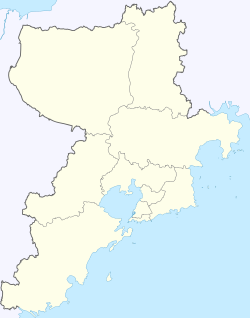Xihai'an
| Xihai'an 西海岸新区 | |
|---|---|
| District & State-level new area | |
| Xihai'an New Area | |
.jpg) | |
 Xihai'an Location of the district seat in Qingdao | |
| Coordinates: 35°52′23″N 120°2′26″E / 35.87306°N 120.04056°ECoordinates: 35°52′23″N 120°2′26″E / 35.87306°N 120.04056°E | |
| Country | People's Republic of China |
| Province | Shandong |
| Sub-provincial city | Qingdao |
| Township-level divisions |
12 subdistricts 11 towns |
| District seat | Yinzhu Subdistrict (隐珠街道) |
| Area | |
| • Total | 2,220.10 km2 (857.19 sq mi) |
| Elevation | 25 m (83 ft) |
| Population (2010) | |
| • Total | 1,392,600 |
| • Density | 630/km2 (1,600/sq mi) |
| Time zone | UTC+8 (China Standard) |
| Postal code | 266500 |
| Area code(s) | 0532 |
| Website |
huangdao |
| Xihai'an | |||||||
| Traditional Chinese | 西海岸新區 | ||||||
|---|---|---|---|---|---|---|---|
| Simplified Chinese | 西海岸新区 | ||||||
| Literal meaning | West Coast New Area | ||||||
| |||||||
| Huangdao District | |||||||
| Traditional Chinese | 黃島區 | ||||||
| Simplified Chinese | 黄岛区 | ||||||
| Literal meaning | Yellow Island District | ||||||
| |||||||
Xihai'an also known as Qingdao West Coast (formerly Huangdao District) is a district of Qingdao, Shandong, China, located southwest and west of the main urban area of the city on the western shore of Jiaozhou Bay. It was identical to Qingdao Economic and Technological Development Zone (QETDZ) (simplified Chinese: 青岛经济技术开发区; traditional Chinese: 青島經濟技術開發區; pinyin: Qīngdǎo Jīngjì Jìshù Kāifāqū) which was launched in 1985 after the zone was merged with Huangdao District and set up the Free Trade Zone in 1992. In December 2012, neighbouring Jiaonan City was merged into Huangdao.[1]
The pillar industries engaged in the zone include electronics, household electric appliances, building materials, petrochemicals, machinery and pharmaceuticals.[2][3] It is connected via the Jiaozhou Bay Bridge.
In mid-2018 the Ministry of Civil Affairs approve the consolidation of Huangdao District Government and Xihai'an New Area Government into a single governing body becoming the third administrative state-level new areas after Pudong and Binhai. The number of living people is 1.71 million in 2014.
Administrative divisions
Xihai'an is divided into 12 subdistricts and 10 more rural towns; the latter half of the current subdistricts and all towns were ceded from Jiaonan City.[4][5]
Subdistricts (街道)
|
|
Towns (镇)
|
|
References
- ↑ 青岛调整部分行政区划 撤销黄岛区、胶南市等 (in Chinese). Sina Finance. 1 December 2012. Retrieved 2013-01-06.
- ↑ Introduction to Qingdao Economic & Technical Development Zone Qingdao Government
- ↑ Qingdao Economic and Technological Development Zone chinadaily.com.cn 2006-04-19
- ↑ 2011年统计用区划代码和城乡划分代码:黄岛区 (in Chinese). National Bureau of Statistics of the People's Republic of China. Archived from the original on 2013-01-07. Retrieved 2013-01-06.
- ↑ 2011年统计用区划代码和城乡划分代码:胶南市 (in Chinese). National Bureau of Statistics of the People's Republic of China. Archived from the original on 2013-01-07. Retrieved 2013-01-06.
External links
- Qingdao Economic and Technological Development Zone (in Chinese)